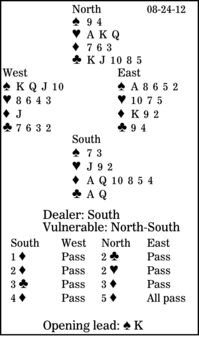Bridge column, August 24: Shall we turn this way or that?

This week we have been looking at some challenging bidding deals. The first priority is to try to get to game, preferably four spades, four hearts or three no-trump. You think about five of a minor when you are confident that none of those contracts can make. Let's study the auction in today's deal.
South opens one diamond, North responds two clubs, and South rebids two diamonds. So far, so easy. But what should North do next? He is thinking about three no-trump, but he does not have a spade stopper. He tries to make this clear to his partner by rebidding two hearts. Yes, South will expect North to have four hearts, but it is the best North can do. (Four hearts on a 4-3 fit might even be the best contract.) This is a responder's reverse, which initiates a game-force.
South has no spade stopper, so cannot bid no-trump. Since ace-queen-doubleton of clubs is as good as three low cards, he shows secondary club support. North now indicates his diamond support. South sets diamonds as trumps, and North raises to game.
Against five diamonds, the defenders cash two spade tricks, then exit with a heart. South must play the trump suit without loss. The correct play is low to the queen, winning when West has a singleton jack or East holds king-doubleton.
** ** **
COPYRIGHT: 2012, UNITED FEATURE SYNDICATE
DISTRIBUTED BY UNIVERSAL UCLICK FOR UFS

